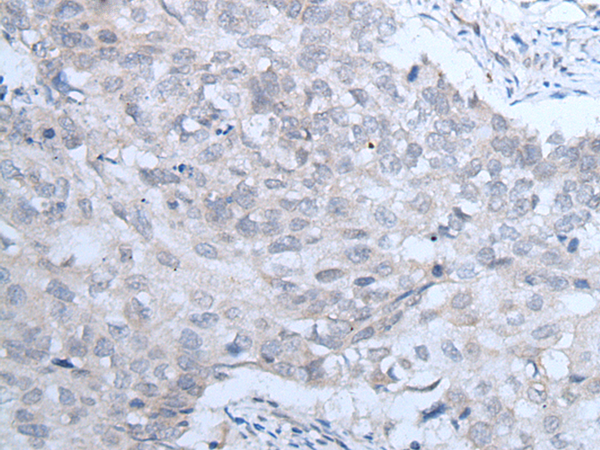
| WB | 咨询技术 | Human,Mouse,Rat |
| IF | 咨询技术 | Human,Mouse,Rat |
| IHC | 1/20-1/100 | Human,Mouse,Rat |
| ICC | 技术咨询 | Human,Mouse,Rat |
| FCM | 咨询技术 | Human,Mouse,Rat |
| Elisa | 1/5000-1/10000 | Human,Mouse,Rat |
| Aliases | IGFR; CD221; IGFIR; JTK13 |
| Host/Isotype | Rabbit IgG |
| Antibody Type | Primary antibody |
| Storage | Store at 4°C short term. Aliquot and store at -20°C long term. Avoid freeze/thaw cycles. |
| Species Reactivity | Human, Mouse, Rat |
| Immunogen | Synthetic peptide of human IGF1R |
| Formulation | Purified antibody in PBS with 0.05% sodium azide and 50% glycerol. |
+ +
以下是关于IGF1R抗体的3-4条参考文献,按格式要求整理:
---
1. **文献名称**:*Phase II study of the anti-insulin-like growth factor type 1 receptor antibody figitumumab in advanced nonsmall cell lung cancer*
**作者**:Karp DD 等
**摘要**:该II期临床试验评估了figitumumab联合化疗在晚期非小细胞肺癌患者中的疗效。结果显示部分患者肿瘤缩小,但总体生存期改善有限,同时提示需关注高血糖等副作用。
2. **文献名称**:*Insulin-like growth factor-1 receptor inhibitor resistance in breast cancer and therapeutic strategies to overcome it*
**作者**:Huang F 等
**摘要**:研究探讨了乳腺癌中IGF1R抗体治疗的耐药机制,发现耐药性与PI3K/AKT/mTOR通路异常激活相关,并提出了联合靶向治疗可逆转耐药性。
3. **文献名称**:*A phase I pharmacokinetic and pharmacodynamic study of the anti-IGF-1R monoclonal antibody cixutumumab in patients with advanced solid tumors*
**作者**:Tolcher AW 等
**摘要**:该I期临床试验评估了cixutumumab的安全性和药代动力学特性,在晚期实体瘤患者中观察到药物耐受性良好,部分患者疾病稳定,支持进一步临床研究。
4. **文献名称**:*The insulin-like growth factor system in cancer: Emerging therapeutic strategies*
**作者**:Weroha SJ 和 Haluska P
**摘要**:综述总结了IGF1R抗体在癌症治疗中的进展,指出单药疗效有限,但联合化疗或其他靶向药物可能改善疗效,并讨论了生物标志物筛选的重要性。
---
以上文献涵盖了临床试验、耐药机制及综述,反映了IGF1R抗体研究的核心方向。
The insulin-like growth factor 1 receptor (IGF1R) is a transmembrane tyrosine kinase receptor critical for regulating cell growth, differentiation, and survival. It binds primarily to IGF-1 and IGF-2. activating downstream signaling pathways like PI3K/AKT and RAS/MAPK. Overexpression or hyperactivation of IGF1R is implicated in various cancers, including breast, colorectal, and lung cancers, as well as metabolic and neurodegenerative disorders.
IGF1R-targeting antibodies are designed to block ligand binding or receptor dimerization, inhibiting oncogenic signaling. Monoclonal antibodies (e.g., figitumumab, cixutumumab) have been tested in clinical trials, showing limited efficacy as monotherapies due to tumor resistance mechanisms and pathway redundancy. Recent research focuses on combining IGF1R antibodies with chemotherapy, targeted therapies, or immune checkpoint inhibitors to enhance antitumor effects. Challenges include optimizing patient selection via biomarkers and managing off-target toxicity.
Despite mixed clinical outcomes, IGF1R remains a compelling target, with ongoing studies exploring its role in modulating the tumor microenvironment and synergizing with emerging therapies.
×